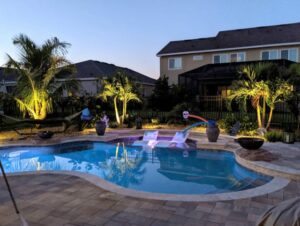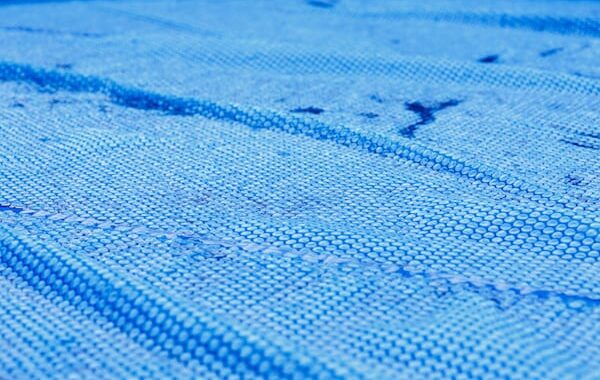Did you know that your swimming pool can lose about a quarter of an inch of water each day? On top of that, wind, humidity and sunlight can drastically increase these water loss rates.
You may wake up one morning and notice that the water level looks lower than usual in your backyard pool. Do you wonder what could be the cause? More than likely it is a result of evaporation. But how can you be so sure?
We’ve compiled a list of water evaporation causes that you might find helpful in determining the cause of your pool water loss–also a few ideas to help decrease evaporation.

Evaporation occurs whenever you expose wind or air to the surface of your pool. So in short, this applies to every pool, all the time. Water molecules rise to the surface, form into a vapor and eventually get released into the air. Heated pools on cool nights experience evaporation more rapidly.
Exposure to Sunlight
Does your pool get direct sunlight daily throughout the day? A fully exposed pool means more water evaporation. Exposure. The more your pool is exposed to the sun and wind, the more evaporation you’ll see. Also unscreened pools will lose more than a screened pool. However, we don’t expect all pool owners to build a pool enclosure as this an expensive add-on, but keep in mind that fences, structures, even trees near the location of a pool helps lower the amount of evaporation that occurs in pools.
Lack of Humidity
If you happen to live in an area where there is little to no humidity, water evaporation would be the main cause of water loss. Here’s how evaporation works. Evaporation can be compared to that of a sponge. The drier the heat, the more water is absorbed. An environment with higher humidity will lose less water. An environment with lower humidity will result in water evaporation.
Temperature
A summer’s intense heat can be a huge contributor to the water loss in your pool. The intense heat during the day mixed with the cooler weather at night is the perfect recipe for evaporation. Here’s an easy explanation on why this water evaporation occurs. The difference in temperature between your pool water and the outside air is what causes evaporation. Imagine your pool as a pot of water on the stove; as the water starts to heat up, contact with air causes steam, which causes evaporation to occur.
Want to help decrease your evaporation?

Now that we know the cause of evaporation, what can we do to decrease it? A few simple and inexpensive ways to help decrease your water evaporation in your swimming pool would be to use a solar cover, reduce your water temperature, and/or add landscaping/windbreaks.
A solar cover is a great way to shield pool water and decrease water evaporation. In fact, a solar cover can reduce water evaporation up to 95% when used regularly. This is why it’s suggested first, it’s the most effective.
Reduce your water temperature and make it a bit on the chilly side. This can be a simple step, especially during the hotter months of summer. Make that jump in the pool refreshing!
Add additional landscape, trees, bushes and the like, to block the wind and help break it. Even outdoor furniture and fencing will help reduce evaporation.
So now that you know water evaporation is caused by exposure, humidity and water temperature you can do your best to minimize it by using a solar cover, reducing your water temperature and adding landscape and/or windbreaks.
